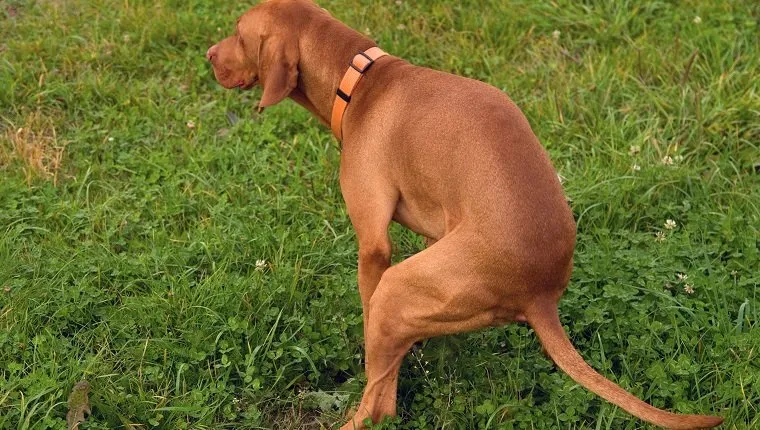There’s nothing quite like starting your morning with a surprise in the backyard. You go to pick up your dog’s poop like any other day and, bam, it’s got this weird shiny goo all over it.
Almost like jelly. Not the grape kind, though. More like something you’d expect from a sci-fi movie.

Naturally, your brain goes straight to panic mode. Is something seriously wrong? Did they eat something weird? Should you be rushing to the vet, or is this just a one-off?
Let’s break it down in a real-world, no-fluff kind of way.
What Is Jelly-Like Poop in Dogs?
That slimy, mucus-like stuff you’re seeing isn’t just random gunk. It’s actually mucus from your dog’s intestines, specifically the large intestine.
It’s kind of the body’s way of saying, “Hey, something’s irritated down here.” A little mucus here and there isn’t always an emergency. But if it keeps showing up, your dog’s gut is likely inflamed or stressed out.
And let’s be honest, nobody wants their dog’s butt drama to be a regular thing.
Common Causes of Mucus in Stool
Dogs eat stuff they shouldn’t. That’s no surprise. A crusty piece of toast from the bin, half a sock, or a suspicious patch of grass.
When they do, their digestive system often responds with a “not today” and sends everything out fast, with a side of mucus.
Diet changes are another sneaky culprit. Even switching to a new food too quickly can throw your pup’s stomach into chaos.
Stress can also mess with a dog’s gut, just like it does with people. A recent move, fireworks, boarding, or a new pet in the house can all trigger inflammation and weird poop.
Then there’s the nasty stuff. Parasites, bacterial infections, and colitis (inflammation of the colon) can all cause that jelly-like slime.
In some cases, you’ll see blood in there too. If that’s happening, it’s time to call the vet. No questions asked.
When Is It an Emergency?
If your dog is still acting like their usual goofy self and eating normally, a little mucus once or twice isn’t always a full-blown emergency. But there are red flags to watch for.
If there’s blood mixed in, if the poop is completely liquid for more than a day or two, or if your dog is lethargic, vomiting, or not eating, don’t wait around.
These signs could point to something more serious, like a parasite infestation, infection, or even something blocking the digestive tract. That’s when you skip the Google spiral and ring up the vet.
What to Tell Your Vet
So you’ve booked a vet visit. Good move. Now what?
Bring a sample of the poop if possible. Yes, it’s gross. No, they won’t be weird about it. Vets see way worse.
Try to track what’s been happening. When did the jelly-like poop start? How often? Has their food changed? Any new treats or table scraps? Did your dog raid the garbage last week when no one was looking?
Also note any other weirdness. Has your dog been gassy? Eating grass? Waking you up at night needing to go outside? These little details help your vet put the puzzle together.
Supporting Your Dog’s Gut at Home
Once your vet rules out anything major, there are some things you can do at home to help your dog’s digestive system chill out.
Keep meals simple and consistent. Avoid giving new treats or people food for a while. Some dogs respond well to a bland diet for a couple of days, like boiled chicken and rice, but always check with your vet before switching things up.
Make sure they’re drinking water. Dehydration can sneak in fast when the gut’s irritated.
Some vets might recommend probiotics to help balance the bacteria in your dog’s tummy. Don’t just grab something from the store, ask what they suggest. Not all supplements are created equal.
Mucus Doesn’t Mean You’re Failing as a Dog Parent
Poop isn’t exactly dinner table conversation, but it says a lot about your dog’s health.
Spotting something weird doesn’t mean you’re doing anything wrong. It just means your dog’s body is trying to deal with something.
Dogs have delicate guts. Even one wrong snack can throw the whole system into a wobbly mess.
Whether your dog’s the type to eat socks or just has a sensitive stomach, jelly-like poop is your clue to pay attention.
Keep an Eye, Stay Calm
Jelly-like poop can be unsettling. It’s sticky, weird-looking, and raises way more questions than answers.
But a lot of the time, it’s a sign of something manageabl, something that can be fixed with a little patience, a vet check, and maybe cutting back on the rogue snacks.
You know your dog best. If they’re acting off or the poop parade doesn’t let up, don’t guess. Get them checked.
So, what’s your dog’s gut trying to tell you today?